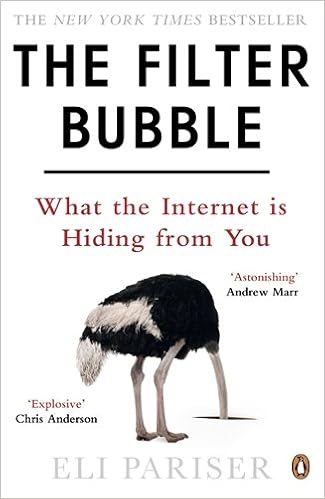You might have noticed this change on your FB feeds sometime ago. You see some of your friend's FB statuses and not all of them. As you would probably guess, Facebook has personalised your feeds. Facebook algorithm will choose what you see based on how you interact with your friends. I think that is a really big problem and the only way to see different people appear on your feed is to intentionally interact with them. So much trouble right?
What does that mean to the internet? What does that mean to us?
Then I was looking up the internet and I found Eli Pariser who, according to Wikipedia, is a left-wing political and internet activist. He is also Chief Executive of Upworthy (https://www.upworthy.com/), the board president of MoveOn.org and a co-founder of Avaaz.org.
Here is a video of his talk on TED. He called this phenomenon "filter bubble".
He even wrote a book.
The Filter Bubble: What the Internet Is Hiding from You which you can buy on amazon. He has been thinking about this problem for a while (the book and the video were published in 2011).
Pariser points out that many web services are doing this. Facebook and Google are some prime examples. We experience this every day when we use search engines, social media sites etc.
Pariser points out that for us to grow intellectually, it is equally important for us to interact with those that disagree with us and those that agree with us. With information 'invisibly' personalised and delivered to us. Are we too happy with the junk food / candy that Facebook and Google have given to us that we no longer wish for the carrots? In that sense, have we lost sight of what the internet was meant to be?
I want to bring up the concept of dérive (drift) which was a technique for understanding and developing the theory of psychogeography. It was developed by the Letterist International (1940s) and subsequently adopted by the Situationist International (1950s). In performing a dérive, one must clear their minds of their intentions or motives and allow oneself to be drawn by the attractions of the terrain and encounters.
 For the Situationists, dérive are essential to counter the increasingly predictable and monotonous experience of everyday life in advanced capitalism. In that sense, the dérive is meant to disrupt our usual paths and brings us a new awareness of our city. When I was an art student, I was pretty blown away by the Situationists International and their antics. I am not sure if it resonates as much now, but dérive is still relevant and can be good way to rethink Singapore or any city.
For the Situationists, dérive are essential to counter the increasingly predictable and monotonous experience of everyday life in advanced capitalism. In that sense, the dérive is meant to disrupt our usual paths and brings us a new awareness of our city. When I was an art student, I was pretty blown away by the Situationists International and their antics. I am not sure if it resonates as much now, but dérive is still relevant and can be good way to rethink Singapore or any city.
I often get lost on the web. Moving from video to video, page to page - feeding my curious mind. In some ways, I would like to think of it as some kind of electronic dérive on the internet super highway. With the Filter bubble, we do need to think if we are really 'drifting' as freely as we think we are. Or are we made to think that way and in actual fact, we are really not growing intellectually.
Before we continue, I need to point out that there are also some people out there who disagreed that the filter bubble exists (or is negligible) [read here & here].
For something closer to home, law academic, Eugene Tan pointed out that the internet and social media will not be a game-changer in the elections because of 'echo chamber effect'. He observed that social media only attract those who share the same sort of views [1 , 2].
If Tan is right about the 'echo chamber effect' of social media, then Pariser is right in arguing that this filter bubble will ultimately be bad for us and bad for democracy. In that sense, I am disappointed at how social media have developed. I think the developers have lost the plot.
This struggle for the freedom to surf what you don't yet know has something to do with the politics of big data [3]. It is important for more people to discuss this and try to understand how that can change our lives.




No comments:
Post a Comment